Recent Photography
I am a terrible photographer and seem to struggle getting any good pictures. But with a little patience and some study, my yield has gone up, though it still is well under 20%. Just for self-motivation, rather than any sense anyone out there is interested, here are a few of my recent photos that I thought came out pretty well. A couple are experiments with HDR photography. As usual click for enlargement:
Cinque Terre. The HDR process in the first one really brings out the details, but like a sharpness filter turned up too high, the image falls apart when zoomed too much.
The next one could have been awesome if I had waited, say, 12 hours for the sun to be in the right place
This is the town of Portovenere
And at night, which was beautiful but I tried a zillion exposures and could never get quite what I wanted
I loved all the little winding staircases. I struggled to capture the romantic element that attracted me to them. This one came out the best, but still failed to get what I wanted
A couple of views from the roof of the Milan Duomo. I really loved walking among the flying buttresses and thought these made interesting subjects. These are probably my favorite shots from the whole batch. They are both HDR shots.
And here are the spires on the same roof:
The Grand Canyon and Sedona
Haze seems to be my never-ending enemy of good landscape photos. I have tried filters of various sorts. In the shot below, I tried HDR which really cut the haze but left the tree in the foreground as a blur (due to its movement between the photos that were combined to make the picture).
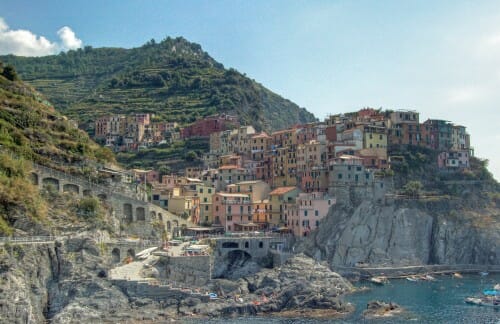
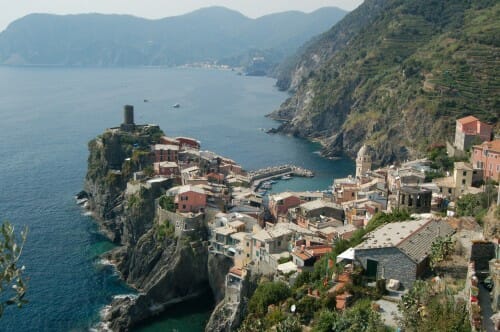
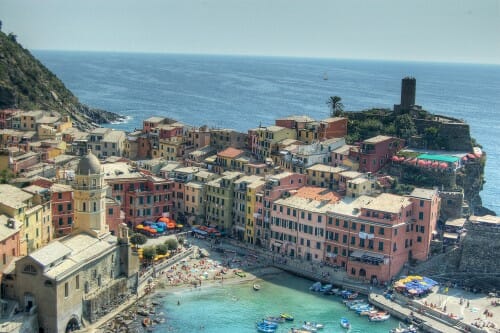
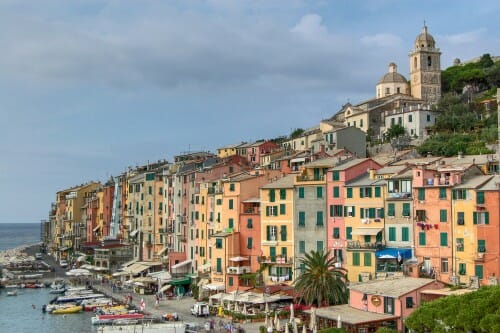
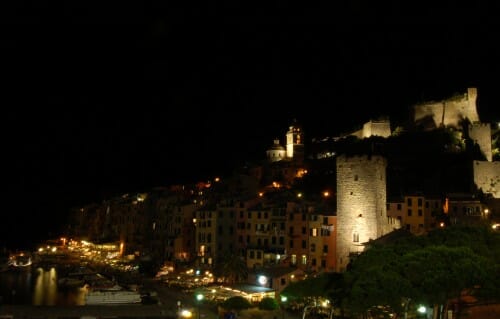
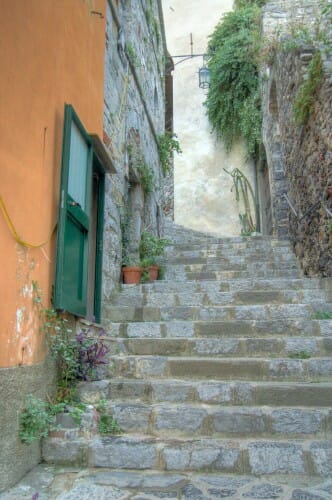
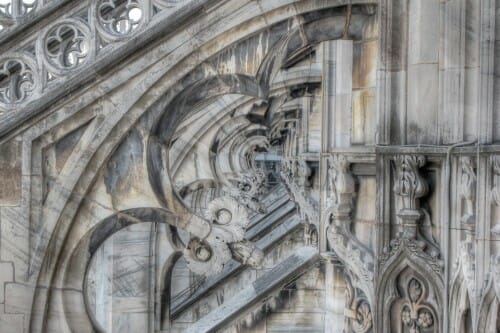
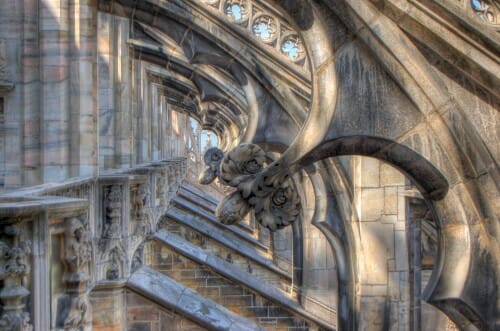


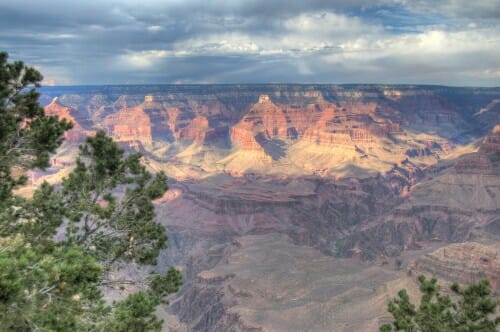
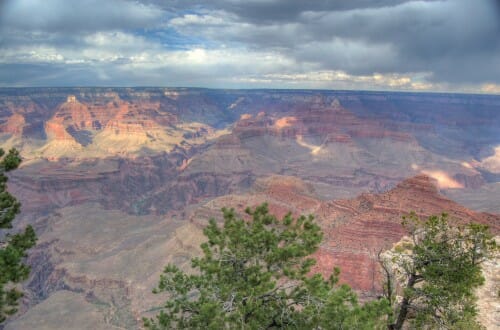
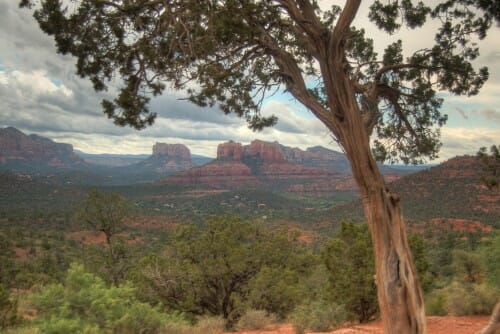

Hi Coyote. Try adding some more contrast and saturation with photoshop and pay attention to the horizon on your landscapes, some are tilted and can be easily fixed in photoshop. Also, I'd suggest checking out photosig.com to improve your photography.
The cathedral shots are nice. The staircase shot would be great with more color and contrast imho. Best haze cutting filter I've found is a circular polarizer. -Eric J.
The key to good photography:
(1) Go somewhere photogenic
(2) Take many photos
:)
ditto on the circular polarizer.
David Zetland nailed two out of three. It also helps a lot if you taken them within an hour after dawn or before sunset. Warm, raking light is magical. Sun blasting down in the middle of the day lights everything too evenly; you need contrast.
But the Cinque Terre and Duomo photos are very good just as they are. The Duomo roof detail ones could maybe use more contrast in PS, though it's easy to overdo that kind of thing.
You've got some good shots, and I agree with Eric Johnson about the contrast. Just for fun I took one of your Grand Canyon shots in to Photoshop and applied a simple adjustment and it looked a lot better. In particular, I added a true black point which helped to bring out more color and detail. I like the closeups of the gothic architecture.
The most relevant fact about professional photographers in the old days?
They could write off the cost of film from their taxes, as a business expense.
The most relevant fact about good photographers now?
The marginal cost of digital photographs is effectively $0.
Take LOTS and LOTS of pictures. I'm talking an OBSCENE amount of pictures. Experiment WILDLY. Be prepared to throw away the overwhelming majority. Remember Sturgeon's Law? Well, if he'd been talking about photography, he'd have been called an insane optimist by everyone who's ever done it seriously. Be prepared to discard well more than 90% of what you shoot.
The difference between a really bad photographer and an OK photographer comes down to technique. But the main difference between an OK photographer and a bordering-on-world-class photographer is VOLUME.
Those pictures, generally, are pretty good. But if you'd shot 20 more of each scene, each one slightly different, do you suppose that some of what you found on the memory card mightn't have been meaningfully _better_?
All the advise above is good, bits are cheap, use them! Another suggestion, from what I learned in art photography many years ago, is to look at the edges of the frame while composing your shot, try not to treat your camera like a binocular. My Prof. beat this particular aspect of photography more than any other. To ad drama to a scene, he had us deliberately cut objects off at the edges, in other words, don't try to fit everything into the shot at once.
And like Matt said, "Take LOTS and LOTS of pictures."
If you didn't max out your card taking shots at soccer practice, you didn't take enough.
Hey Coyote,
Personally, I think your shots are fine - but I agree w/ all the comments above also. Just one caveat on the comments: I don't really like the idea of using Photoshop to "doctor" photos. I realize it in itself is a part of the digital photo realm, and it also takes skill - but I have na old-fashioned sense that it's, well, cheating a bit. But whatever!
Couple things: 1) Taking LOTS of photos is spot-on. Adding to that, EXPERIMENT with different camera settings, and make yourself a log book to track which settings you use for which shot. Also log sun angle (may be obvious from the photo), the time, and humidity or air quality. Just a suggestion. 2) Did you try any B&W? If no, why not?? Some of those might have been killer in BW !
Regards,
Chem